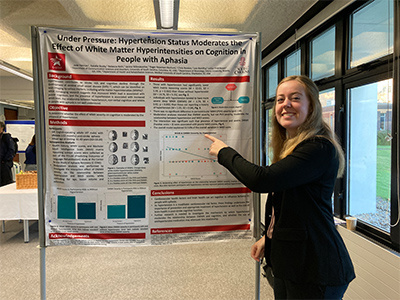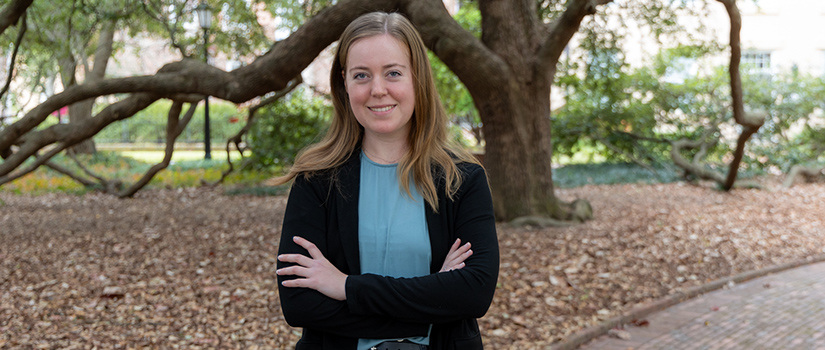For a neuroscience major, a theater professor might be an unexpected choice for a research advisor. But for senior Jade Hannan, a weekly theater workshop has played a central role in her honors thesis.
Peter Duffy of the Department of Theatre and Dance is one of the professors who is guiding Hannan’s research on “Play on Words,” a theater program for people with aphasia to find community by creating and performing original plays.
“My research is on how engagement in a drama group can benefit the communication confidence of people with aphasia,” she says. “The actors get to create their own lines, but they also use nonverbal communication like gestures and facial expressions, which can be helpful for people with language disorders.”
Hannan has participated in the group for two semesters and interviewed several of the actors about their experiences. Her thesis will examine how the actors report changes in their confidence and use of creative communication as a result of participating in the group.
“Dr. Duffy is teaching me how to code the interviews and pull out the themes and big ideas,” Hannan says. “It’s definitely very different from any of the research I’ve done before.”
Meanwhile, Dirk den Ouden, professor of communication disorders, is supporting the science side of Hannan’s training in neuroscience.
She has worked with USC’s Aphasia Lab since her freshman year. Among other projects, Hannan did a literature review for USC's Aging Brain Cohort that has now been published, and she presented her findings at an international conference this fall.

But in addition to learning how to analyze data and current trends in the field, Hannan has found that studying the humanities has helped her build skills she will need as a future physician or clinical researcher.
“As someone going into medicine, the goal is to be patient centered, to look at the person in front of you and see them for the stories and the aspects they’re bringing individually,” Hannan says.
“That's what I’m aiming to do with the theater workshop study, and I hope it will transfer in the future.”
A solid foundation in science and more
Hannan grew up learning about neuroscience from her mother, a physical therapist who specializes in working with people dealing with stroke or brain injury.
Now, Hannan wants to work with patients, whether in a health care or research setting, and the College of Arts and Sciences offered her the chance to integrate neuroscience into her pre-medical track.
She will be one of the first to graduate from USC with the new neuroscience major. The program gave her the science background she needs to attend medical school or go on to work in neuroscience research, but she was also able to take humanities classes that align with her unique goals and interests.
Hannan double majored in French to fulfill her goal of studying abroad. During her junior year, she lived in France and studied in her second language for a semester.
While some cautioned that this might take her attention away from her neuroscience studies, Hannan says that navigating life in a place where she was totally immersed in a second language expanded her outlook on the experience of living with aphasia.
“It’s frustrating to know what you want to say, but you’re so much slower with finding your words in the new language and you make mistakes,” Hannan says. “You know other people will notice and you worry about how they’ll perceive you. That is magnified for someone who deals with aphasia every day.”
Hannan has found that experience with the humanities, from theater to French, not only gives her greater insight into the science of language recovery but also into the human element of neuroscience, as she’s seen in working with the actors from “Play on Words.”
“It makes me a more empathetic listener, and it makes me want to take the time to really understand not just the words they’re saying, but what they’re communicating,” she says.
In a few years, Hannan plans to attend medical school, though she hopes to work in research or earn a master’s degree overseas in the interim. This fall, she attended the 2023 Academy of Aphasia annual conference in the United Kingdom, where she attended talks and sessions with experts from around the world.
“It really opened my eyes to how much I could do with this degree and my background in aphasia and communications disorders,” she says. “It’s a very interdisciplinary field, and there’s so much happening in the community.”
